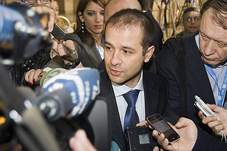Georgian and Abkhazian sides meet in Gali
By Temuri Kiguradze
Wednesday, July 15

The Georgian delegation was led by Shota Utiashvili, head of the Information and Analytical Department at the Georgian Interior Ministry. “The meeting was mainly dedicated to technical procedural issues,” said Utiashvili, adding that a “polemic” took place between the Georgian and Abkhazian sides. “It has been decided that the next meeting will be conducted after two weeks,” stated Utiashvili, speaking in Tbilisi on July 14.
The Abkhazian side announced its “satisfaction” with the results of the meeting. “The meeting was very successful,” stated Maxim Gvinjia, the de facto Abkhazian Foreign Minister, who also participated in the negotiations. “There were no main misunderstandings, the dialogue was constructive, and we managed to agree on the date of the next meeting. I think that this process will bring some positive results for the strengthening of security in the region,” Gvinjia told The Messenger just after the meeting.
Representatives of international organisations who also attended the Gali talks announced that the results of the meeting “are positive.” “I’m satisfied with this meeting, this is a step forward because two opposing sides managed to sit at the negotiations table,” stated Hansjorg Haber, head of the European Union Monitoring Mission in Georgia, after the meeting. The UN Secretary General’s Special Representative in Georgia Johan Verbeke also commented on the positive aspect of the meeting, saying that Russian side was “quite restrained” on July 14. The sides agreed to appoint a UN representative as Chair for the next meeting.
The meeting was conducted as part of the incident prevention mechanism which was agreed during the sixth round of negotiations between the sides of the conflict in Geneva last month. The July 14 Gali meeting was the first direct discussion there since the previous dialogue between the Georgian Government and Abkhazia’s de facto rulers was suspended in 2007.
“The negotiations have passed normally,” stated Temur Iakobashvili, Georgian State Minister on Reintegration Issues. He noted that this meeting “was purely technical and doesn’t represent a political dialogue [between the sides].” “I think that these kind of meetings are necessary and concrete results could be gained that will preserve stability [in the zone of conflict].” Gali is a town in the Georgian breakaway region of Abkhazia mainly populated by ethnic Georgians. The Gali district is not controlled by the central Georgian Government and Tbilisi and international organisations have many times declared that the Abkhazian separatist authorities frequently violate the human rights of ethnic Georgians in Gali.
The Georgian authorities expressed the hope that incident prevention mechanism meetings will help “reduce tensions” in Gali. The same kind of meetings took place in South Ossetia, however after two rounds of talks the South Ossetian separatists refused to participate in the negotiations in the existing format.
“These [incident prevention] mechanisms remain the best way for all sides to respond swiftly to security incidents on the ground, and are an important practical step to help foster and maintain stability and security,” stated the representatives of EU, OSCE and UN in a joint statement after the sixth round of the negotiations in Geneva.
